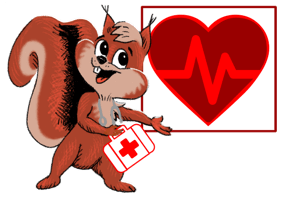A stroke is a sudden interruption of blood flow to a region of the brain, due either to a blockage in, or the bursting of, one of the vessels supplying that region. The interruption of blood flow leads to the injury and death of brain cells, and can thus result in paralysis, cognitive impairment, and other significant disabilities.
Today, early interventions are available to reduce the likelihood of such disabilities after a stroke. Know the signs of stroke so that you can seek medical help immediately . . . .
SIGNS OF STROKE
* Sudden numbness or weakness of the face, arm, or leg.
* Sudden confusion, difficulty speaking or understanding.
* Sudden and severe headache, without a known cause.
* Sudden dizziness, loss of steadiness or coordination.
* Sudden nausea and vomiting, unrelated to viral illness.
* An episode of unconsciousness or convulsions.
More information
More information
Subcategories 4
Related categories 1
Sites 12
Consumer health resource center, providing information on the causes, symptoms, and urgent treatment of stroke.
Clinical reference on ischemic and hemorrhagic strokes. Covered topics include differential diagnosis, etiological determination, radiologic investigations, and management of patients within the National Service Framework.
Created by a brain-stem-stroke survivor who hopes to encourage others to get involved in recreational activities. Her post-stroke hobbies include embroidery and outings on a motorized scooter.
Cites a study linking uric acid levels to high volumes of so-called white matter hyperintensities (WMH), which are small dead areas of the brain that occur when brain cells are deprived of oxygen.
Link collection and personal story of Louis Albert, a survivor with diabetes and aphasia who has used assistive technology to create his site.
From the archives of the journal, literature covering topics such as antithrombotic therapy, cerebral thrombosis, and carotid stenosis.
Provides information on this serious medical condition that occurs when the blood supply to the brain is disturbed. Includes an animation and details of symptoms, causes, diagnosis, treatment, recovery, prevention and complications.
Provides information on this form of mini-stroke. Includes a short video on strokes and details of symptoms, causes, diagnosis, treatment, complications and prevention.
Presentation by a family hoping to help others who are affected by stroke. Offers notes on disability benefits and insurance matters, fundamental information on stroke, and links to stroke-related sites.
The NHS urges people to recognise the symptoms of stroke: fallen face, inability to hold arms high, slurred speech; and to know the importance of time — act fast to get medical help.
Resource for stroke carers. It provides on-line advice, support and information.
In-depth information, including symptoms, treatments, and prevention.
Resource for stroke carers. It provides on-line advice, support and information.
Provides information on this form of mini-stroke. Includes a short video on strokes and details of symptoms, causes, diagnosis, treatment, complications and prevention.
Consumer health resource center, providing information on the causes, symptoms, and urgent treatment of stroke.
From the archives of the journal, literature covering topics such as antithrombotic therapy, cerebral thrombosis, and carotid stenosis.
The NHS urges people to recognise the symptoms of stroke: fallen face, inability to hold arms high, slurred speech; and to know the importance of time — act fast to get medical help.
Provides information on this serious medical condition that occurs when the blood supply to the brain is disturbed. Includes an animation and details of symptoms, causes, diagnosis, treatment, recovery, prevention and complications.
In-depth information, including symptoms, treatments, and prevention.
Cites a study linking uric acid levels to high volumes of so-called white matter hyperintensities (WMH), which are small dead areas of the brain that occur when brain cells are deprived of oxygen.
Presentation by a family hoping to help others who are affected by stroke. Offers notes on disability benefits and insurance matters, fundamental information on stroke, and links to stroke-related sites.
Link collection and personal story of Louis Albert, a survivor with diabetes and aphasia who has used assistive technology to create his site.
Clinical reference on ischemic and hemorrhagic strokes. Covered topics include differential diagnosis, etiological determination, radiologic investigations, and management of patients within the National Service Framework.
Created by a brain-stem-stroke survivor who hopes to encourage others to get involved in recreational activities. Her post-stroke hobbies include embroidery and outings on a motorized scooter.
Other languages 5
